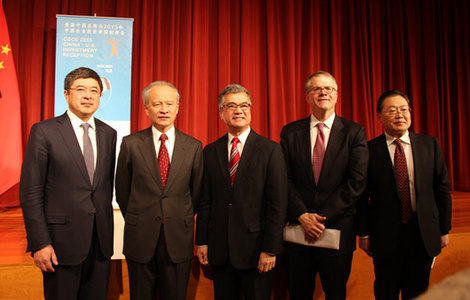Strong support for London's offshore RMB activities
Updated: 2015-03-26 02:54
By Cecily Liu(chinadaily.com.cn)
|
||||||||
Growing offshore renminbi business is crucial for London's financial services industry to maintain its global competitiveness, Andrea Leadsom, a Member of the British Parliament and the economic secretary to the Treasury, told China Daily in an exclusive interview on Wednesday.
"We think that the internationalization of the renminbi is one of the most important developments in financial markets in decades, so we are very keen to promote London as the offshore renminbi center for trading," Leadsom said.
Leadsom was speaking at the London Stock Exchange, which listed its first ever renminbi-denominated exchange traded fund on Wednesday. It is listed by China Construction Bank International and Commerzbank, and marks a milestone that will help to develop the renminbi asset management industry in the UK.
The new ETF, called the Commerzbank CCBI RQFII Money Market UCITS ETF, will give European and other international investors access to China Interbank Bond Market securities, which is otherwise not available due to China's capital account controls.
Leadsom said the fact CCBI and Commerzbank chose London to list the ETF demonstrates the city's financial strength, and the British government will support the further growth of offshore renminbi activities in London.
"We want the UK to be the main center for offshore renminbi activities outside Asia, and so far we are seeing some success. Offshore renminbi activities have already experienced rapid growth compared to 20 years ago," Leadsom said.
"We think as China is the world's second largest economy we are keen to see the renminbi become a more widely used currency for trades in goods and services, and we want to develop financial products to support that," she said.
London's efforts to develop offshore renminbi activities started in 2011 when the then Chinese Vice-Premier Wang Qishan welcomed private-sector initiatives for the development of an offshore renminbi market in London, during his meetings with the British Chancellor George Osborne.
Leadsom said it is vital to the UK's interests to support and promote the increasing growth of offshore renminbi volumes and in addition use London's expertise to develop renminbi products.
According to the latest City of London statistics, London's total trade finance rose 79 percent over the second half of 2013 to 26.5 billion yuan ($4.14 billion, 3.73 billion euros).
Overall forex activity in renminbi products rapidly increased in the first half of 2014. Total volumes of renminbi forex trading more than doubled (up 116 percent) over the record high in the second half of 2013.
In the first six months of 2014, total deliverable renminbi forex business rose by 127 percent, giving a total average daily volume of $42.4 billion.
One important milestone that demonstrated the UK government's strong support is its issuance of the first non-Chinese sovereign renminbi bond in 2014.
Leadsom said that the UK government will work closely with the private sector to grow London's offshore renminbi activities, and demonstrate its support by working closely with the Chinese government.
She added that Chinese banks contribute greatly to London's financial services sector, and that she is pleased that the UK's financial services sector regulator has recently awarded branch licenses to two Chinese banks, allowing them to expand the scope of their activities in the UK.
Branches have lending and financing capacity proportional to the parent company's balance sheet. Subsidiaries, in contrast, are subject to the strict capital requirements that apply to local banks in the UK. Hence, in most cases, the lending and financing capacity is proportional to the balance sheet of the subsidiary itself

 Your city in the shape of tiny round planet
Your city in the shape of tiny round planet
 Families mourn victims of Airbus A320 crash
Families mourn victims of Airbus A320 crash
 38,000 Brazilian troops to safeguard 2016 Rio Olympics
38,000 Brazilian troops to safeguard 2016 Rio Olympics
 Chinese investors well received
Chinese investors well received
 Top 9 cities in China with highest cost of living
Top 9 cities in China with highest cost of living
 Would you take a challenge for charity?
Would you take a challenge for charity?
 Snow blankets Chicago after spring storm
Snow blankets Chicago after spring storm
 Haze descends on Paris
Haze descends on Paris
Most Viewed
Editor's Picks

|

|

|

|

|

|
Today's Top News
China, US work to clear legal hurdles
Cockpit voice recorder of crashed German plane found
US states reach out to China
Chinese investors well received
US states seek China ties at investment summit
Small US businesses using RMB for transactions: Survey
Iconic Chinese play hits America
Christie's has richest Asia Week
US Weekly

|

|







